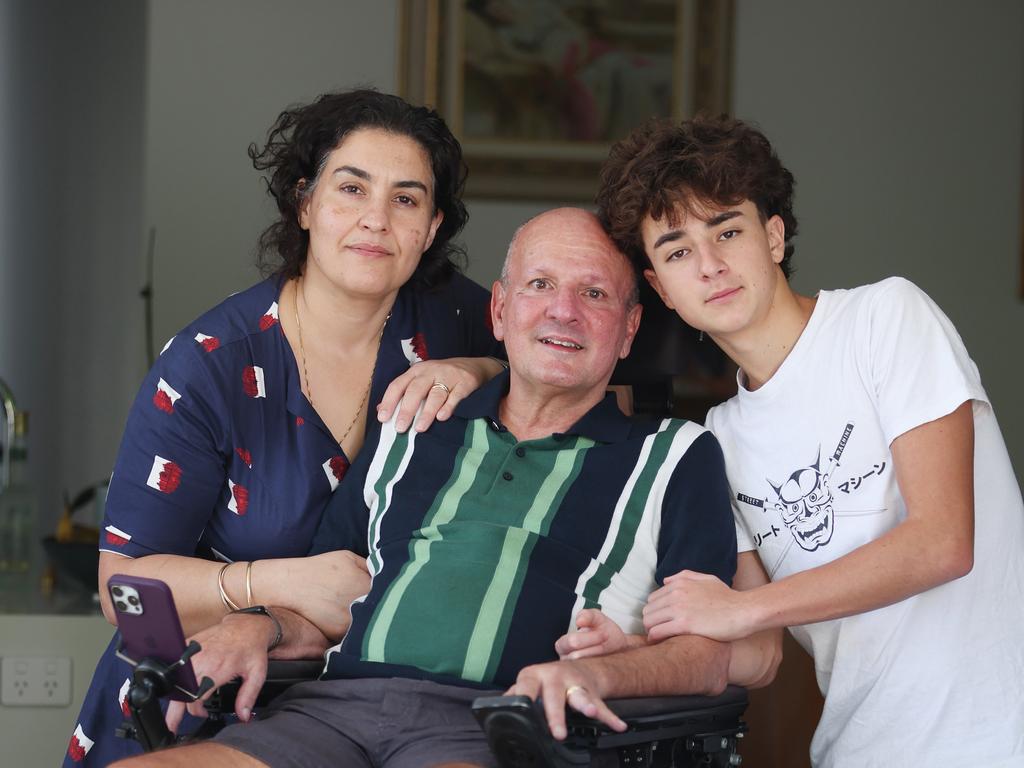Veteran makes plea for federal funding to aid the fight against motor neurone disease
An Air Force veteran who first noticed he had trouble cocking his gun while deployed in Afghanistan now needs his wife’s help to lift his arms to hug his son as he battles a deadly disease and calls for more to be done to help others.
QLD News
Don't miss out on the headlines from QLD News. Followed categories will be added to My News.
An Air Force veteran who first noticed he had trouble cocking his gun while deployed in Afghanistan now needs his wife’s help to lift his arms to hug his son.
Queensland man Peter Russo, 63, is fighting for increased funding as he battles “insidious” motor neurone disease.
Having previously been fit and healthy his whole life, Mr Russo had completed six overseas deployments, served 15 years in the Australian Defence Force, and was heavily involved in sport.
But, in 2018, Mr Russo noticed the muscles in his right arm had grown weak and he couldn’t cock his rifle during an Afghanistan deployment.
After a few stumbles and a fall down the stairs, he went to see a neurologist the following year, where he was given the horrifying news he could have MND. The disease affects the motor neurons – nerves in the brain – and causes muscle weakness and wasting over time. There is currently no cure for the degenerative disease.
“He (the doctor) said the good news is you don’t have brain cancer, the bad news is I suspect you have MND … see me every three months until you pass,” Mr Russo said.
“He said there is no cure, there is not a lot of support. I went outside, sat in my car and honestly cried for 20 minutes.”

It took another three years, a spinal surgery, and six more neurologists for Mr Russo to be formally diagnosed, and the disease has slowly been progressing since. By the time he was diagnosed in August 2022 he could still drive a car but now Mr Russo can’t move his arms at all, requires a wheelchair, and his breathing is supported by a bi-level machine.
“Six months ago I could confidently work my motorised wheelchair, 12 months ago I could give you a thumbs-up,” he explained.
“It is just an avalanche or a snowball rolling down a hill that is coming to get you. It affects my movement and eventually my speech … I can’t imagine losing that.”
Mr Russo’s wife Tess helps care for him, something for which he is incredibly grateful.
“It is just so cruel, like for Tess and I to go to the movies, it takes about three hours for me to get ready to go. She has to dress me, shower me,” he said. “My younger son Jonty flew up from Melbourne on Monday and Tess had to lift my arms to give him a hug. It is an insidious disease, absolutely insidious.”
As an MND Australia ambassador, Mr Russo has called on the federal government to provide more funding for research. The Australian government invested $2m in 2024-25 to support research into the disease, but Mr Russo said that is not enough.
“Research programs typically cost around $10m each phase, there is a lot of behind-the-scenes work that goes into a trial,” he explained.
In Australia, one in 300 people will be diagnosed with MND, but Mr Russo stresses that number could increase if the government does not do something about it.
A spokesperson for federal Health Minister Mark Butler said there was always more to do and Labor would continue to support Australians and their families living with MND.
“Over the past decade, the Australian Government has invested over $120m in health and medical research for MND,” the spokesperson said.
Originally published as Veteran makes plea for federal funding to aid the fight against motor neurone disease







